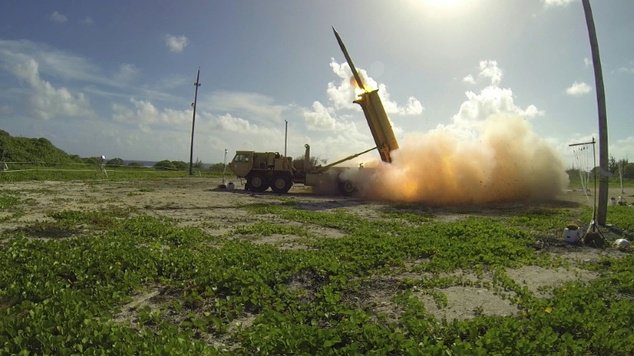
Doha, Qatar | AFP | The United States agreed a $12-billion warplane sale to Qatar and began manoeuvres with its military Thursday, re-affirming support for the emirate in the throes of a diplomatic crisis with its neighbours.
A deal for the “state-of-the-art” F-15 fighters was signed by Qatar in Washington, which has sent conflicting signals to its longtime ally in the crisis that has seen Saudi Arabia and its allies impose sweeping sanctions on the emirate.
Last week, US President Donald Trump expressed support for the Saudi-led allegations against Qatar, charging it had “historically been a funder of terrorism at a very high level”.
Pentagon and State Department officials have since scrambled to reassure the emirate, which hosts the largest US airbase in the Middle East and the command headquarters for operations in Iraq, Syria and Afghanistan.
US Defence Secretary Jim Mattis welcomed his Qatari counterpart Khalid al-Attiyah to Washington on Wednesday for the F-15 sale.
“The $12-billion sale will give Qatar a state-of-the-art capability and increase security cooperation and interoperability between the United States and Qatar,” the Pentagon said.
It did not provide additional details on the sale but Bloomberg reported it could involve as many as 36 warplanes.
Attiyah said the agreement would boost Qatar’s defences and create 60,000 jobs in the United States.
“We believe that this agreement will propel Qatar’s ability to provide for its own security, while also reducing the burden placed upon the United States military in conducting operations against violent extremism,” he said.
The Pentagon meanwhile deployed two warships to carry out joint manoeuvres with the Qatari navy in the Gulf.
The vessels docked in Hamad Port, south Doha, on Wednesday, the Qatari defence ministry said.
– ‘Strong signal’ –
One Western diplomat in Qatar said this would send a message to Doha and other Gulf states.
“The deal and the naval exercise is a strong signal for Qatar and I am sure that reassures the government in Doha that their relationship is strong,” said the source.
Mattis and Attiyah also discussed the US-led military campaign against the Islamic State group and “the importance of de-escalating tensions” in the Gulf.
Washington has voiced concern about the impact of the crisis on its fight against IS, just as it climaxes in the jihadists’ Iraq and Syria bastions, Mosul and Raqa.
Secretary of State Rex Tillerson said last week the rift was “hindering” the campaign and urged Saudi Arabia and its allies to ease their “blockade”.
At a Washington news conference with Tillerson on Wednesday, Saudi Foreign Minister Adel al-Jubeir denied the sanctions amounted to a blockade, insisting it was the kingdom’s sovereign right to close its airspace to Qatari aircraft and seal the emirate’s sole land border.
Saudi Arabia and its allies — led by the United Arab Emirates, Egypt and Bahrain — have said there can be no mending of ties until Qatar ends its support for “terrorist” groups.
But Qatar and its allies — led by Turkey — say the emirate has every right to conduct an independent foreign policy and have branded the sanctions imposed as “inhumane and un-Islamic”.
– Turkey courts ‘wise’ Saudi –
Turkey has thrown its support behind a UN-backed mediation effort by Kuwait, one of the Gulf states which did not join the Saudi-led sanctions.
Its foreign minister, Mevlut Cavusoglu, was in Kuwait on Thursday, and said he would travel to Saudi Arabia for more talks on Friday.
“Tomorrow all being well we will continue the talks with Saudi Arabia in Mecca,” Cavusoglu said after returning to Turkey.
“We are working hard as brothers to solve this problem and get over this process.”
While standing squarely behind its ally, Turkey has been anxious not to antagonise Saudi Arabia, which it has called a “wise state and big brother of the region”.
Qatar continued its diplomatic push outside the region, with Emir Sheikh Tamim bin Hamad Al-Thani holding a telephone call with the Angela Merkel.
“The German chancellor stressed during the call the need to solve the crisis through dialogue,” said a statement posted on the Qatar News Agency.
The UN has expressed concern about the humanitarian impact of the crisis.
As well as severing economic and political ties, the four governments ordered Qataris out within 14 days and called home their own citizens.
Bahrain and the UAE have also banned expressions of sympathy for Qatar.
Bahrain says it has detained a citizen for sympathising with the emirate on social media.
“I am alarmed about the possible impact on many people’s human rights,” said UN human rights chief Zeid Ra’ad Al Hussein.
“It is becoming clear that the measures being adopted are overly broad in scope and implementation.”
Qatar’s isolation has raised fears its gas-rich economy could be hit, but the emirate says it is so far unaffected.
Standard & Poor’s lowered its credit rating of the state-run Qatar Petroleum to AA- because of the ongoing crisis.
It said the “blockade” could “exacerbate Qatar’s external vulnerabilities and could put pressure on its economic growth and fiscal metrics”.
 The Independent Uganda: You get the Truth we Pay the Price
The Independent Uganda: You get the Truth we Pay the Price





